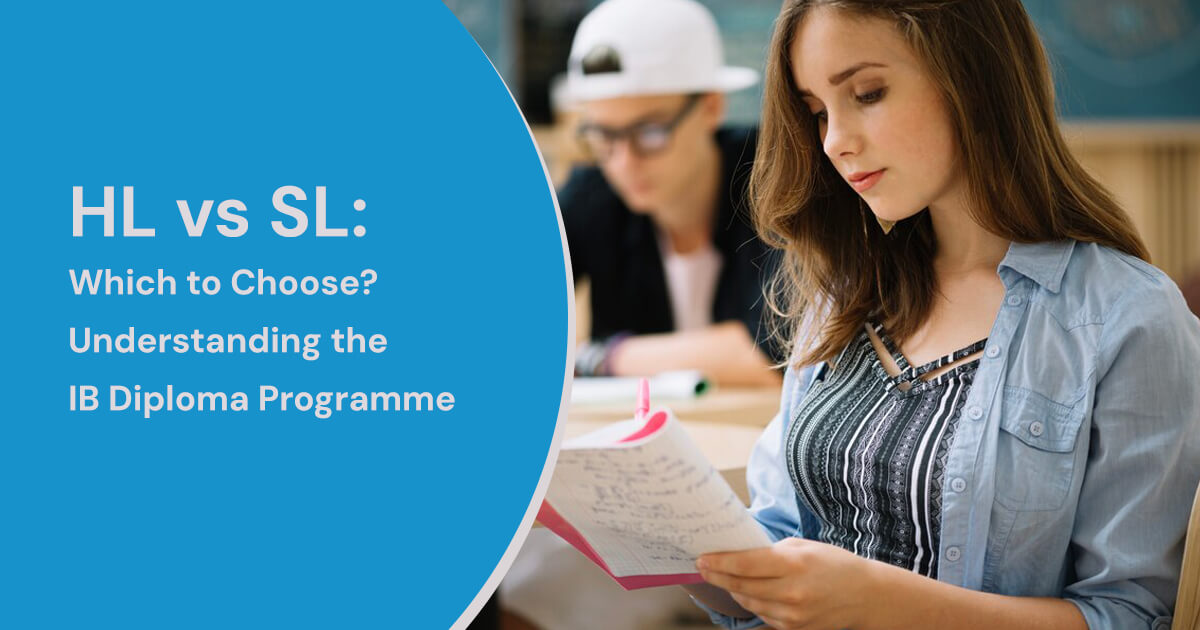Table of Contents
The choice between the International Baccalaureate programme’s Higher Level (HL) and Standard Level (SL) courses is crucial for students. Understanding the merits, demerits, and outcomes of each level guides their academic path.
Understanding the IB Diploma Programme
The International Baccalaureate (IB) Diploma Programme is a challenging two-year globally acknowledged programme for 16 to 19-year-olds. It creates inquiring, knowledgeable, and caring young individuals. It consists of six subject groups and three core elements: Extended Essay (EE), Theory of Knowledge (TOK), and Creativity, Activity, and Service (CAS).
Students must take six subjects: three HL courses and three SL courses. Both types of courses comprise three core components, which reflect an integrated approach to teaching.
What are Higher Level (HL) Courses?
- Depth of Study: HL coursework expects students to study subjects in depth than SL coursework because it usually involves 240 teaching hours compared to 150 hours in SL coursework.
- Complexity: The content and assessments in HL classes are tougher than SL classes which need higher levels of critical thinking, analysis, and knowledge application.
- Preparation for University: Universities recognise HL courses as having a difficulty level equal to introductory college coursework, thus sometimes conferring advanced standing or college credit on students upon completion.
What are Standard Level (SL) Courses?
- The Breadth of Study: While covering the same course content as the HL course, SLs do not go as in-depth or handle complex themes as their HL counterparts.
- Balanced Workload: Designed to be less demanding in time and effort, it helps students maintain a balanced workload and manage their entire IB experience.
- Flexibility: The lessons become more extensive and complete (well-rounded) by taking HL subjects alongside SL courses.
Factors to Consider When Choosing Between HL and SL
- Interest and Passion: Go for HL classes on subjects you are passionate about. Engaging in exciting material can help you handle this choice's additional work and complexity.
- Academic Strengths: Evaluate your strengths and weak areas in different subjects. If you have good grades, consider taking a subject at HL, which will give you the confidence to manage it well due to its complex nature.
- Future Goals: If you are planning for a university or college, find out the prerequisites for doing an HL course. Research your prospective tertiary institution's requirements before making your choices of subjects.
- Workload Management: Consider the increased workload from challenging courses such as those at Higher Level (HL). Balancing three HL studies with three SL topics, as well as the basic parts of the IB programme, requires strong time management and organisational abilities.
- Teacher Recommendations: Talk to your teachers or IB coordinator. They know more about your grade performance levels, thus helping you make informed decisions about which is best between HLs and SLs.
Benefits of Higher-Level Courses
- An In-Depth Grasp of Knowledge: Higher-level courses go into more detail about topics, thereby developing higher-order understanding and mastering it. This is especially helpful for subjects linked to your future major in college.
- University Recognition: Many universities regard HL courses as equal to freshman-level college courses. It gives way to advanced standing or course exemptions. This will save you time and money by decreasing the credits you must complete in college.
- Improved Critical Thinking Skills: The demanding workload of HL classes hones critical thinking, analytical, and problem-solving skills that are useful not only in higher education but also in various walks of life.
Benefits of Standard-Level Courses
- Well-Rounded Education: Standard-level courses provide a complete academic experience and stimulate different interests. High-level ones focus too much on one area. This mix helps create a balanced experience.
- Managing Workload: SL classes enable students to have an organised timetable, reducing strain while providing enough time to take part in other IB components, extracurricular activities, and personal affairs.
- Flexibility: SL courses have flexible timetables to help complete their IB core elements (EE, TOK, CAS). It enables them to reach a well-rounded IB experience.
Striking the Right Balance
To select HL or SL classes under the IB Programme, one must consider their interests and strengths. Taking higher-level subjects increases depth and challenge, preparing them for university studies and critical thinking abilities. Standard-level subjects are broader; this guarantees balance when taking several classes at once.
Finally, the combination of HL and SL courses will depend on your inclinations and future endeavours. By picking the right subjects, you can enjoy the IB Diploma Programme and ensure a fulfilling educational path. Always seek advice from professors, counsellors, and peers, and make informed decisions that align with your aspirations.
Frequently Asked Questions (FAQs)
Higher Level (HL) courses delve deeper into subjects with more rigorous content and assessments compared to Standard Level (SL) courses, which cover the same topics but to a lesser extent.
Students take three HL courses and three SL courses, making a total of six subjects in the IB Diploma Programme.
Factors to consider include academic strengths, future university goals, workload management, interest in the subject, and recommendations from teachers or IB coordinators.
Yes, HL courses are often seen as equivalent to freshman-level college courses by universities, potentially offering advanced standing or course exemptions.
HL courses prepare students with more in-depth subject knowledge and critical thinking skills, aligning them closely with the demands of university-level coursework.
